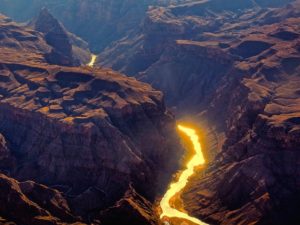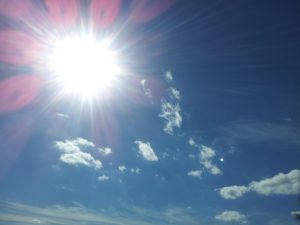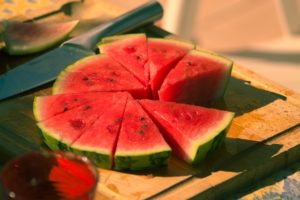In Chinese medicine, there is a condition called Summerheat. It seems appropriate to write about it after we’ve had a string of 90 degree days here in Minnesota in late May and early June. I’ve only experienced Summerheat once, but it was memorable. It happened during my first backpacking trip down into the Grand Canyon one October almost 30 years ago. Our small group of four began hiking down from the North Rim at an elevation of 8,500 feet, and over two days slowly snaked our way down to the Colorado River, losing 6,000 feet of elevation in the process. Over the course of those two days, the scenery and climate changed in a way that’s been compared to hiking from the forests of Canada to the blistering desert landscape of Mexico.
 I held my own for the better part of two days. My pack was heavy, but it was full of water bottles and I was drinking. However, as we got closer to the river it became hot, we were scrambling over large rocks and we had not seen a drop of shade for hours. I thought I was doing okay, but I was hot and working really hard. Fairly late in the afternoon on that second day, we arrived at what can only be described as an oasis; a waterfall that sprang out of the canyon wall, the source of a burbling creek. It was surrounded by scrub and some large trees.
I held my own for the better part of two days. My pack was heavy, but it was full of water bottles and I was drinking. However, as we got closer to the river it became hot, we were scrambling over large rocks and we had not seen a drop of shade for hours. I thought I was doing okay, but I was hot and working really hard. Fairly late in the afternoon on that second day, we arrived at what can only be described as an oasis; a waterfall that sprang out of the canyon wall, the source of a burbling creek. It was surrounded by scrub and some large trees.
I didn’t realize it, but by that time, damage from the heat had already set in. I had become disoriented and strayed off the trail. While I wasn’t really lost because I could follow the creek, I became separated from my fellow hikers. I plopped into the creek for a few minutes to try to cool off, but I had no idea that I was in trouble. At that point, I was unsure if my friends were in front or behind me on the trail. I pulled myself out of the creek and kept hiking downhill, not sure of where I was going. The trail crossed the creek and forked, which sent me into a panic, but I stayed on the trail that followed the creek downstream—a no-brainer if I hadn’t been heat impaired. I was completely freaked out thinking that I was lost and separated from my group, in the middle of nowhere.
Ultimately, I kept following the creek and came upon one of my friends who had dropped his pack at what would be our camp site for the next couple of days. I had arrived! I sat on a rock, completely exhausted, and in short order I began shivering uncontrollably. Despite the temperature being in the high 80’s, I was freezing cold and would continue to be for the next several hours.
I realize now that what I had was heat exhaustion, and my symptoms were common; I had become disoriented, exhausted, dehydrated and despite being overheated, I had stopped sweating and was really cold. Was what I experienced life-threatening? It’s hard to know, but I realize now that it quickly could have gone bad and turned into an emergency. And it scared me enough that in subsequent trips to the Canyon, I made darn sure it didn’t happen again.
into an emergency. And it scared me enough that in subsequent trips to the Canyon, I made darn sure it didn’t happen again.
In Chinese medicine, what I experienced is called Summerheat. It’s a pattern of pathogenic heat, of which there are several kinds. You can have heat that causes a fever, hot flashes, flushing and even heat that rises upward and causes migraines. Summerheat is unique in that it’s caused by being exposed to hot weather. Basically, it injures your energy (Qi), exhausts you and dries you out. In humid weather, it can also cause a kind of internal dampness that can upset your digestion and make you feel nauseous and heavy, cause diarrhea, dizziness and irritability.
There is a range of severity and symptoms when it comes to Summerheat. In my case, I became exhausted, confused, dehydrated and intolerant to both more heat and the cold. I was also probably running a fever. Other symptoms that are characteristic of Summerheat include:
- Headaches
- Dizziness
- Irritability
- Thirst
- Heavy sweating or a lack of sweating
- Shortness of breath
- Delirium
- Loss of consciousness
Interestingly, the nature of heat is to rise upward, and with Summerheat, most of the symptoms involve the head or upper body. For me, this was the case as I became disoriented and panicky, and my face became really red, an indication of the heat rising upward in my body. Feeling impossibly cold during that episode was an indication that my internal thermostat had been damaged as well.
So, what can you do for Summerheat? In Chinese medicine, one of the first lines of defense are foods that can cool you off. One of the most effective is watermelon, which  is not only a food, but it’s also classified as a Chinese herb. Full of moisture, sweet and with very cooling properties, watermelon tastes good and clears heat. Not as popular, but just as effective are mung beans. Boil these small dried legumes—about a cup in three cups of water—and drink the water. And while not considered Chinese herbs, drinking fluids that contain electrolytes, such as those found in sports drinks can also help by rehydrating and replacing your body’s minerals lost through heavy sweating.
is not only a food, but it’s also classified as a Chinese herb. Full of moisture, sweet and with very cooling properties, watermelon tastes good and clears heat. Not as popular, but just as effective are mung beans. Boil these small dried legumes—about a cup in three cups of water—and drink the water. And while not considered Chinese herbs, drinking fluids that contain electrolytes, such as those found in sports drinks can also help by rehydrating and replacing your body’s minerals lost through heavy sweating.
Acupuncture can also help for episodes of Summerheat. In fact, there are some very specific protocols to clear heat and revive someone with severe symptoms. However, it’s important to know that if your symptoms are severe, such as loss of consciousness, rapid heartbeat, confusion or a throbbing headache, you should seek immediate medical attention as heat-related injuries can be a medical emergency.
There are a few things that you should not do if you’re experiencing Summerheat symptoms. While it may be tempting, avoid eating ice cold foods and drinks. When your body is hot, having something ice cold is really hard on your stomach and doesn’t help to cool you off overall. This is also true for overeating; your stomach can’t handle the stress in the moment. And as you’re rehydrating, drink fluids with electrolytes instead of plain water. The reasoning here is that you’ve already lost electrolytes through sweating. Drinking plain water further dilutes the concentration of your body’s electrolytes and can lead to a condition called hyponatremia, a life-threatening drop in sodium concentration in your cells.
My best advice if you’re having symptoms of Summerheat (that are not life-threatening), is to sit down, take a rest, cool off in the shade and drink to replenish fluids and electrolytes. And eat some watermelon. Which is exactly what I did that afternoon at the bottom of the Grand Canyon, except for the watermelon. I sat on a rock in the shade by the creek, drank Gatorade and soup and added a layer of clothing until I quit shivering. By the next morning I was fine. A day or two later, hiking out of the canyon, I made sure to take my time and rest more often to avoid overheating. While we were battling the heat in the inner canyon, winter happened up top. After a week of hiking, we emerged out of the canyon to ten inches of snow that closed the North Rim for the winter.



